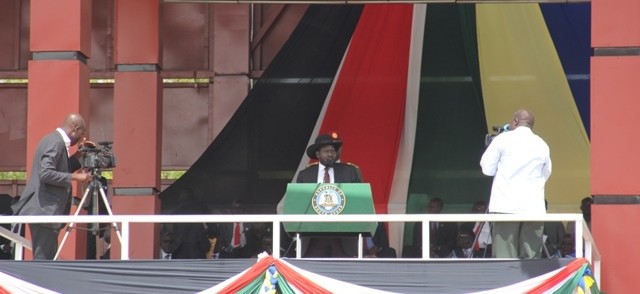President Salva Kiir declared today during his first public rally since the failure of peace talks earlier this month that he is not intimidated by the ‘stick’ of sanctions waved by Western powers, saying “let them hit.” He stressed that he could not be forced into a peace agreement with his foes.
After the unsuccessful conclusion of IGAD peace talks, the European Union announced support for “sanctions against those who have committed war crimes or who impede the process of peace,” while the US claimed it would “hold accountable” those who undermine negotiations.
Addressing a crowd of thousands in the capital Juba today, Kiir explained what went wrong in the final days of the talks earlier this month and he rebuffed threats allegedly made by diplomats during the talks aimed at inducing him to compromise with his rival SPLM-IO rebel leader Riek Machar.
The president disclosed that he refused to give Machar executive powers as prime minister and also refused an alternative IGAD compromise proposal making Machar the vice president. He further refused to allow the rebel forces to maintain a separate command during a transitional period before reintegration.
He also refused a request to pay debts incurred by the opposition, and he refused a compromise proposal on changing the composition of the parliament. He said that he also declined a proposal to eliminate certain ministries and restructure the executive organs of government.
Kiir explained that he did not see the benefit of such compromises: “What Riek wants always is to talk about the change that he will force the government to change this. I said, ‘What is my takeaway now? What do I take home?’”
‘I cannot be threatened’
“We ran into a deadlock. And then the threats of sanctions were being waved in my eyes. They have a very funny language that they say, ‘There are people hanging up there with a stick.’ I told them, brother, that stick, let them hit in any place that they want to hit. If they want to hit the head let them hit, if they want to hit anywhere, then hit. I cannot be threatened with that talk.”
He continued: “In that way, I came to you without peace, when I came. I did not bring peace.”
The president also blamed political opponents for supporting the UN threat of sanctions and he raised fears that the UN might try to take over South Sudan and steal the resources of the people.
Referring to the group of dissident SPLM politicians known as the ‘Former Detainees’, whom he detained last year before sending into exile, Kiir said, “They talked rubbish. Even the talk that the UN wants to make sanctions on South Sudan it came out from them. Even the talk that South Sudan should be under trusteeship for the UN for ten years, this is also from them.”
“And they want the UN to take over South Sudan for ten years and then elections to be conducted by the UN. Any party that will win the elections then have to be handed over power. Do you know what will happen this time when some people – foreigners – will rule the country for ten years? What will you get when ten years is over? Isn’t our problem all about resources? Are you sure that you will get the resources then? And this is why I am saying that this flag will never be brought down by anybody. Because this flag was not raised on its own, it was raised by the blood of all our martyrs.”
‘If war is imposed on us, we will fight back’
The president earlier in his speech also blamed rebel forces for not accepting a military amnesty order that he had given, which would represent an alternative means of reintegration in lieu of a peace agreement.
“Until now they are not accepting the olive branch that I have given to them. If they think that they prefer to fight for their victory, I think there is nothing that we have been doing except war. We know war, how it is. But if it is imposed on us, we will also fight back,” said Kiir.
Kiir concluded his speech with an appeal for unification of the “internal front”, echoing his Sudanese counterpart Omar al-Bashir’s in issuing a call for “national dialogue”.
“Join me and my government in the efforts to unify the internal front, through national dialogue, forgiveness, reconciliation and building consensus on a development path that will lead to harmony, political stability and an economy that allows all of us to prosper,” he told the crowd.
Kiir tasked his party to facilitate this mobilization: “This means that not everyone should go his own way. And I also call on the SPLM General Secretariat to lead this process.”
Photo: President Salva Kiir addresses a crowd in Juba, 18 March 2015 (Radio Tamazuj)




